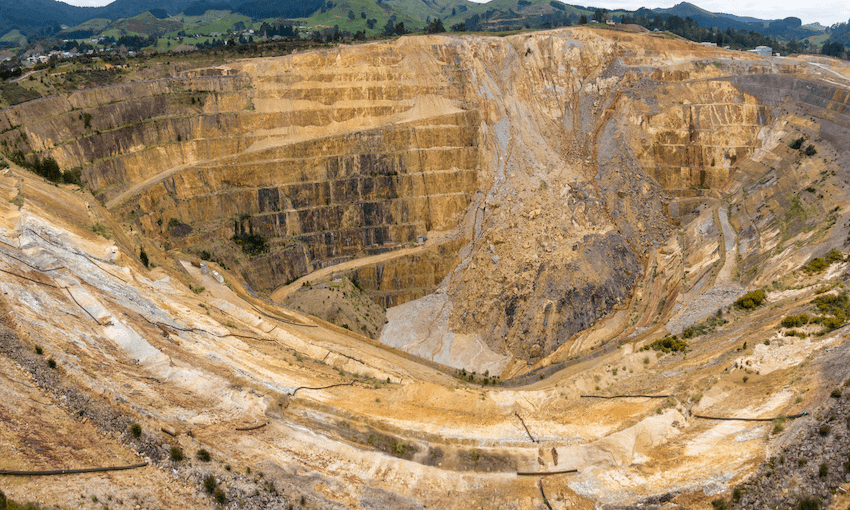By granting a permit to OceanaGold to mine under DOC land in the Coromandel, the government is not only threatening an endangered species, says Catherine Delahunty – it’s threatening future generations.
I woke up angry. The government has given a 40-year permit to OceanaGold to mine under DOC land behind Whangamatā. It’s a waste of time being angry with the mining industry, a pack of dinosaurs pursuing their multinational modus operandi, profiting from weak governance regimes, but I am angry with the government. On August 8, 2017, I stood on the steps of parliament with David Parker and we promised the people that Labour and the Greens would protect the southern Hauraki from new mines. Then came the Speech from the Throne in November 2017 that said “there will be no new mines on conservation land”.
So we waited with hope. The government told us they would consult us on this statement, but nothing has happened. Of course the Greens have tried on the inside to persuade Labour and New Zealand First to honour the promise, but any public challenge from them on this issue has been invisible, until a press release today that opposes the mining permit but does not challenge Labour for breaking the promise made. The communities fighting the multinationals have stood alone while miners have continued drilling and digging on the DOC land. If the promise had been progressed in any way at all, the miners might have felt less keen on investing in mining conservation lands, but the silence has been deafening. We all know the Greens do not have the numbers to force the honouring of the promise but it would be good if they challenged Labour and stopped playing nice to their coalition partners on this issue. It’s not helping them win votes and it’s not helping us hold Labour to account for their promises.
MBIE granted the mining permit because the Crown Minerals Act’s purpose states it exists to facilitate mining. The government has not bothered to change the law to make it subject to Te Tiriti o Waitangi or open to public participation, let alone for a neutral purpose as a minerals manager. Just another failure to protect rights and interests other than those of mining companies.
Meanwhile, high in the forests behind Whangamatā, one of the most endangered frogs in the world lives in a supposedly peaceful habitat on protected land. OceanaGold has drilled in this habitat and now they plan to mine for gold underneath with a huge tunnelling and blasting project. The Archey’s frog is a unique ancient species that has no ears but is highly sensitive to vibration. It spends its life in a very limited area of forest, and no one knows what effects there might be from blasting underneath it.
In addition to the frogs, the area beneath the DOC estate has a very high water table that feeds the beautiful rivers that run down to the coast near Whangamatā. The toxic waste from mining under the DOC land will have to be transported out and dumped, and this means industrialising above ground at some point, as well as adding to the toxic burden at the dumps in Waihi. Then there are the fossil fuels used to dig the tunnels and the subsidence risks associated with underground mining. Collapse cannot be predicted.
Oceana argues there has to be a DOC access agreement and resource consents before it can start mining, but this is no comfort. DOC has access agreements for various levels of mining all over the conservation lands and the resource consent hearings are not level playing fields if you cannot afford expert testimony.
We have been holding this industry at bay on the peninsula for 40 years, with Waihi the company town we could not save from its pits and toxic dumps. But right now, with the price of gold on the rise, we need a modern government to stop the dinosaur polluters who use tonnes and tonnes of fossil fuels as they scrabble after the shiny metal. A modern government would be assisting the new technologies that can now extract gold and silver from landfills, cell phones and laptops. There are companies like Mint Innovation in Auckland that are working towards commercialising and franchising their minerals from e-waste processes. Jobs could be created if the government would help such innovations get off the ground. Given that we currently recycle about 1% of our e-waste, this is essential as well as progressive.
We are sick of the collusion with greed and the rhetoric of jobs from gold. The only town full of mines in our area has a very high social deprivation rating based on the last census. The miners say it’s the high number of retired people, but actually it’s poverty.
We are sick of trying to defend forests, mountains and water for the future generations while the governments of the day undermine the land. We will fight these proposals with all we are and all we have but we are warning the political parties: stop making promises and then breaking them, because it’s too hard. A recent survey showed 70% of citizens want a greener recovery from Covid; 30,000 people marched against mining DOC land in 2010. We do not forget what really matters and we do not forget broken promises. It’s not just about respecting an ancient frog and its habitat, it’s about respecting what we say we value – future generations.
Catherine Delahunty is the chairperson of the Coromandel Watchdog of Hauraki and a former Green MP.





